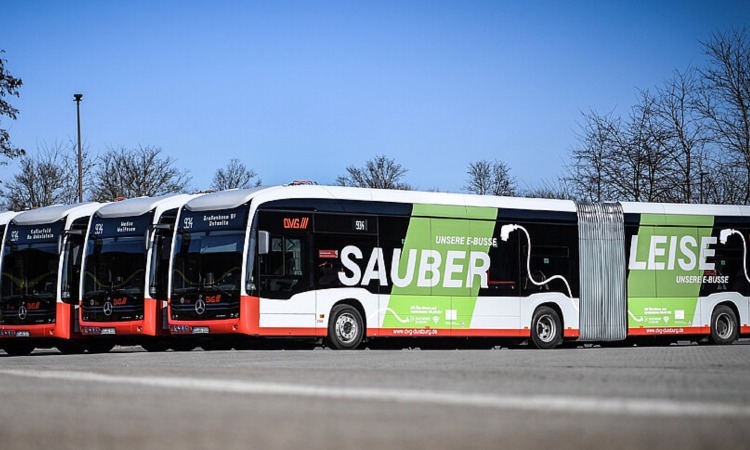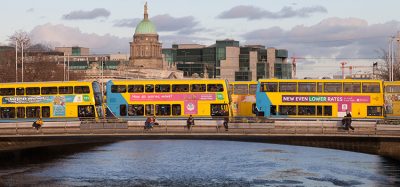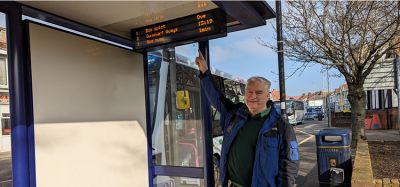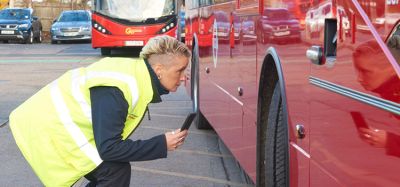DVG announces electrification of Line 934 buses in Duisburg
- Like
- Digg
- Del
- Tumblr
- VKontakte
- Buffer
- Love This
- Odnoklassniki
- Meneame
- Blogger
- Amazon
- Yahoo Mail
- Gmail
- AOL
- Newsvine
- HackerNews
- Evernote
- MySpace
- Mail.ru
- Viadeo
- Line
- Comments
- Yummly
- SMS
- Viber
- Telegram
- Subscribe
- Skype
- Facebook Messenger
- Kakao
- LiveJournal
- Yammer
- Edgar
- Fintel
- Mix
- Instapaper
- Copy Link
Posted: 2 March 2022 | Intelligent Transport | No comments yet
DVG takes another step towards low-emission local public transport, with the launch of seven electric buses – which are expected to reduce noise levels and up to 1,000 tonnes of CO2 in the city every year.


Credit: Duisburger Verkehrsgesellschaft AG
Duisburger Verkehrsgesellschaft AG (DVG) has announced the launch of seven electric eCitario G buses in Duisburg from 1 March 2022. This means that the entire 934 bus line will now run-on battery power – ensuring cleaner air and less noise in the region.
Ina Brandes, Minister of Transport of the State of North Rhine-Westphalia, along with key representatives, including the Mayor of the City of Duisburg, Sören Link, and the CEO of DVG, Marcus Wittig, presented the new electric bus line to the public on 23 February 2022.
The Minister of Transport, Ina Brandes, said: “We want to get more people to switch to buses and trains. This succeeds with attractive offers in local transport; for example, modern buses with electric motors. That is why the state is happy to promote the conversion of bus fleets to climate-friendly drives – like here in Duisburg. I am pleased that the new e-buses are now starting operation and will henceforth be clean, safe and quiet on the road in Duisburg’s city traffic. Low-emission buses are an investment in the future and strengthen air pollution control in cities and communities.”
Line 934’s connection to the bus depot, inner-city route and the Six Lakes District in the south of Duisburg played an essential part in DVG’s decision to electrify the line, as it leads through areas that are considered to be particularly noisy and air polluted. This is why the electrification of the line is expected to improve the air quality in the city.
“As a mobility provider in Duisburg, we are pursuing the goal of low-emission traffic together with the city. With the use of environmentally friendly electric buses, we reduce CO2 emissions and noise levels in the city. This saves us 1,000 tonnes of CO2 every year. In short, the new buses are clean and quiet. This is noticeable for our passengers and also for other road users,” said Marcus Wittig, CEO of DVG.
In total, DVG is investing approximately €9.4 million for the seven vehicles and the required charging and workshop infrastructure. Furthermore, DVG has received funding totalling around €4.5 million, consisting of over €3.51 million from the state via the Rhein-Ruhr transport association and additional federal funds amounting to €785,233.
With 10 powerful, high-voltage battery assemblies, with a total capacity of 330kWh, the electric buses ensure a reasonable range. As charging would take place at the Unkelstein depot, corresponding charging infrastructure has been installed inside and outside of the bus hall. Additionally, a T-mast with two fast chargers on the arms has also been installed outside of the bus parking hall for opportunity charging during line operation. Here, two buses can be charged with a maximum output of 300kW using extendable pantographs.
As part of DVG’s commitment to make transport accessible for all, particularly passengers with restricted mobility, the buses have special areas designated for wheelchairs and prams, on the left and right, in the direction of travel. Attachment straps for rollators are also provided, as well as folding seats for additional passengers in these areas, with two TFT screens to keep passengers informed.
In order to ensure safety, the buses include an active braking assistance system, turning assistant, reversing camera, as well as six cameras to monitor the interior.
Related topics
Air Quality, Alternative Power, Passenger Experience, Public Transport, Sustainable Urban Transport
Related modes
Bus & Coach
Related cities
Duisburg
Related countries
Germany
Related organisations
Duisburger Verkehrsgesellschaft AG (DVG)
Related people
Ina Brandes, Marcus Wittig, Sören Link








